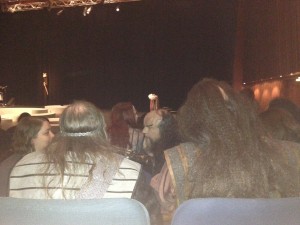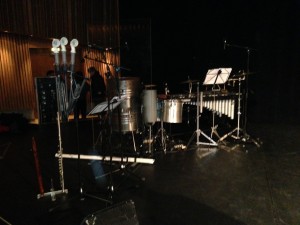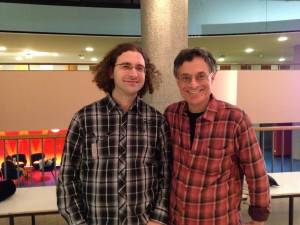Klingon opera in Berlin?! Posted by Chuck Smith on Feb 23, 2013 in Uncategorized

Today, I’ll be taking a quick detour from my usual fare to bring you something different, because last night I attended the opera. If you’ve read the headline, then you have correctly guessed that this opera was entirely in Klingon! When I first heard about it, I was skeptical, but even though I’m not a trekkie, I decided I really can’t pass up going to a Klingon opera!
The lights dimmed and the director came out and said, “The Klingon Terran Research Ensemble presents ‘u’, an authentic Klingon opera, ready for its last performance on earth.” He then explained that Klingon culture places a high value on opera and that Klingons all over the planet love this art form. One of the Klingons sitting in front of me enthusiastically yelled out “Yes!” in agreement. He went on to tell us that Klingon opera is divided into three acts, of which I remember the third is called the “impact act”. We were also informed that audience participation is required, as that we were to scream along during the actor’s battle cry. In Klingon culture, it is considered rude to be silent during these moments.
So, you’re probably wondering how can you enjoy an opera, if you can’t understand a word of it. Well, before each act, the screen behind the set displayed a summary of what would happen in English. Each summary was around 5 paragraphs. It reminded me of the surtitles that are displayed over many “ordinary” opera performances, so you can understand all the words.
The director has chosen, however, to let us bask in the Klingon language from the beginning. From what I know of Klingon, I could tell the language was well pronounced. The woman sitting next to me had studied some Klingon, and said that she had never heard it pronounced so clearly.
The Klingon “orchestra” started to play with music that fit the scenes perfectly. It had an otherworldly sound to it, and was magnificent. Several sounds came close to sounding like an emergency signal from a spaceship, while other parts had heavy percussion to follow along a battle scene. This was often accompanied by the actors and actresses singing in Klingon. Truly a sight and sound to behold!
To give you a feel for the opera, you can view this clip from a Dutch news broadcast about their first performance (starting at 0:35).
http://www.youtube.com/watch?v=s3crHk5wPsI?t=35s
In the third act, the crowd really got into the battle cry and the entire theater erupted in a giant primordal scream from the audience… to show respect for the Klingon arts, of course! All in all, the experience was very enjoyable and would highly recommend attending if they perform near you. They said, unfortunately, that that would be their last performance on earth, but one can always hope that they’ll gear up again sometime!
There was one last surprise though. During the curtain call, one man stood up in the audience to take some pictures and he was none other than Marc Okrand himself, an American linguist who invented the Klingon language! I later learned that he had actually written the script for the entire opera. Even though he denied the request to go on stage for a bow, he was very kind in giving out autographs and having his picture taken with members of the audience. His name was mentioned in the event’s description online, but I don’t think anyone expected him to be there!
Since this is an Esperanto blog, after all, I guess I should have to say I have to wonder if the world of experimental theater would be open to such a play in Esperanto. While not having the concrete cultural background of Klingon, it would have the advantage that carefully chosen words and ways of acting them out could be understood by an audience who can’t speak Esperanto. A brilliant example of this is a performance by Daniel Soloman in his piece La seksa vivo de helikoj (the sex life of snails), given to an audience who can’t speak Esperanto near Stuttgart, Germany. Another idea would be to develop an Esperanto play for the public with surtitles in the local language. What do you think?

Build vocabulary, practice pronunciation, and more with Transparent Language Online. Available anytime, anywhere, on any device.
About the Author: Chuck Smith
I was born in the US, but Esperanto has led me all over the world. I started teaching myself Esperanto on a whim in 2001, not knowing how it would change my life. The timing couldn’t have been better; around that same time I discovered Wikipedia in it’s very early stages and launched the Esperanto version. When I decided to backpack through Europe, I found Esperanto speakers to host me. These connections led me to the Esperanto Youth Organization in Rotterdam, where I worked for a year, using Esperanto as my primary language. Though in recent years I’ve moved on to other endeavors like iOS development, I remain deeply engrained in the Esperanto community, and love keeping you informed of the latest news. The best thing that came from learning Esperanto has been the opportunity to connect with fellow speakers around the globe, so feel free to join in the conversation with a comment! I am now the founder and CTO of the social app Amikumu.







Comments:
miki:
Maybe entertainment companies would add Esperanto subtitles or dub tracks to movies or TV shows in their back catalogues, too, if they thought it would help sell a few DVDs.
http://www.youtube.com/watch?v=XvI3kwNj7Co